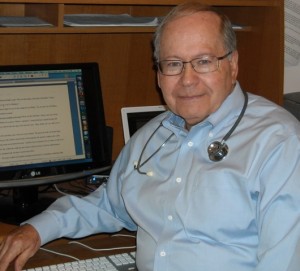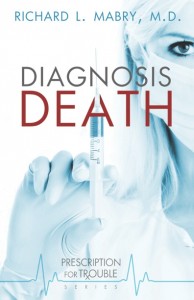Novelist and physician Richard Mabry, M.D. is joining us today on The Literary Mama. Richard is known for writing medical suspense with heart. His latest release, Diagnosis Death, is available now.
*Welcome to The Literary Mama. Tell us a little about yourself.
I’m a physician, retired after thirty-six years of practice, the last ten as a professor at a large medical school in Texas. My first wife passed away twelve years ago (which was the impetus for my book, The Tender Scar: Life After The Death Of A Spouse), but God has blessed me yet again with the love of a wonderful woman. Between the two of us we have five children and four grandchildren, not to mention two granddogs and two grandcats. Spoiling those grandchildren takes much of our time, but I also find time for golf, reading mysteries, and—when I can make myself sit down at the computer—writing them.
*As a doctor you have worked on several medical textbooks, when did you get the fiction bug?
I wrote or edited eight medical textbooks and had over 100 papers published in medical journals, but never really wanted to be a writer, although I’ve read mysteries for years. That all changed after the death of my first wife in 1999. A few years later, as I sought to learn the craft while writing The Tender Scar, authors James Scott Bell and Alton Gansky encouraged me to try my hand at fiction. I did, and four years, four unsuccessful novels, and forty rejections later I became an “overnight success.”
*You are also the Vice President of the American Christian Fiction Writers. What does your role involve for that organization?
The VP is charged with oversight of the main e-loop, which is devoted to the exchange of ideas and information about writing and the publishing industry, as well as being responsible for the website and our http://FictionFinder program. The VP oversees the ACFW’s Recognized Publisher List, both seeing that new applications are properly reviewed and that re-evaluations take place on an annual basis. And, of course, the VP is one of the eight members of the Operating Board that helps run the day-to-day business of the 2000+ member organization. And, in case you’re interested, the Vice-President is not next in line to serve as President of the organization (thank goodness).
*What is Diagnosis Death about? How did you come up with the concept for the novel?
I was casting about for subject matter for my next book when, in the aftermath of Hurricane Katrina, a colleague and friend was accused of the mercy killing of a number of patients. Since I was the one charged with making the decision to remove life support when my first wife died, I was familiar not only with the mechanics but the strong emotions that accompany such a decision. I turned the matter over in my mind, prayed a bit about it, and awoke one morning with the plot arc pretty well in my mind.
Here’s a tease for Diagnosis Death:
The threatening midnight calls followed Dr. Elena Gardner from one city to another, prolonging her grief. Even worse, they are echoed by the whispers of her colleagues—whispers that started after her comatose husband died in the ICU. When a second and yet a third mysterious death took place, the whispers turned into a shout: “Mercy killer.” What was the dark secret that kept Elena from defending herself.
*How much research did Diagnosis Death take?
As I’ve said, I had first-hand experience with the emotions involved in discontinuing life support for a loved one. But, as in all my novels, I did a good bit of checking of the medical facts. Even though I’m a physician, the field of medicine is constantly changing, and I want to be certain that I get the details right.
*What is it about writing medical suspense that attracts you?
I enjoy the exercise of leaving clues (some false, some important) scattered throughout the book, being fair with the readers but hopefully leaving them surprised at some aspect of the plot at the end of the book.
*What other new projects do you have in the future?
My next novel, due out September 1 from Abingdon Press, is Lethal Remedy.
An infection by a “super-bug” has sprung up worldwide, and no current antibiotic will touch it. Dr. Sara Miles has access to an investigational antibiotic developed by her ex-husband, and it proves to be 100% effective. The drug goes into wider use, but someone has falsified data to hide late side effects of the drug and patients develop potentially fatal complicatons. Sara and three trusted colleagues must solve the puzzle of how the new antibiotic really works and come up with a way to reverse the side effects before it kills more patients.
*What is one thing people may be surprised to know about you?
On the high school golf team, I played against (and was soundly beaten by) a future pro golfer. His game has improved even more. Mine hasn’t.
*How can readers get in touch with you?
They can learn more about me on my website, http://rmabry.com, and follow my musings on my blog, http://rmabry.blogspot.com. And, like so many others, I’m on Twitter and Facebook as “RichardMabry.” They can email me at Dr R L Mabry at yahoo dot com.
Thanks for stopping by today!


Thanks for having me here. Hope your readers enjoy Diagnosis Death, and will watch for Lethal Remedy this fall.
Diagnosis Death is on my wish list. Maybe I’ll pick it up at the conference at BlueRidge next week.
Diagnosis Death sounds great. Thanks for the interview.
Doc,
It’s good to learn more about you. I haven’t read one of you books yet, since I tend to read mainly historicals, but they sound great and you have intrigued me.
And don’t be so sure about not being in line for the ACFW presidency. 😀
Thanks for all the comments (which came from members of the ACFW Board, incidentally). And what was it the politician said? If nominated I will not run–if elected I will not serve. Let me see if I get through this term with what passes for my sanity intact.
Again, I appreciate the opportunity to share with readers here.